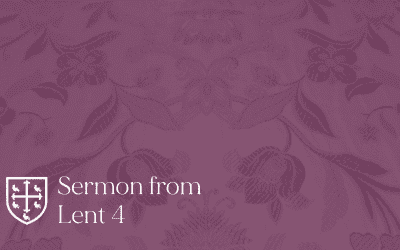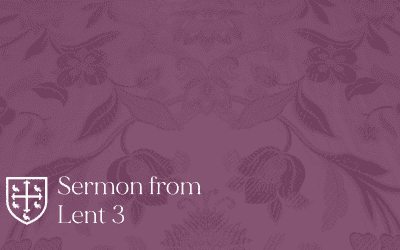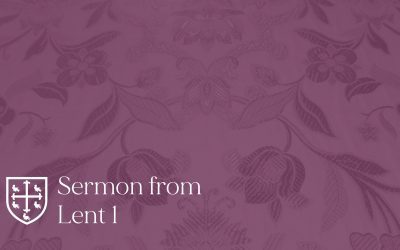Advent 4 Year C 12/22/2024
Micah 5:2-5a; Canticle 15; Hebrews 10:5-10; Luke 1:39-45
Rev. Mark A. Lafler
In the season of Advent there are two primary characters.
The readings give these two biblical figures lots of attention.
One is John the Baptist.
The other is Mary the mother of our Lord.
Both have at least one Sunday in Advent where the readings reflect their stories.
John the Baptist stands out in Advent exemplifying what it means to prepare for the coming of the Lord Jesus.
Mary stands out in Advent exemplifying what it means to be obedient and humble in one’s devotion to God.
Today the Gospel reading points toward part of Mary’s story…
(and also, John the Baptist too).
Mary went to visit her relative Elizabeth.
And when they greeted each other…
Elizabeth’s baby (John the Baptist) leaped for joy in her womb.
That is, in the womb, the baby recognized what was going on with Mary carrying the Savior of the world in her womb.
What a precious narrative about the expectation of the Savior and the value of life – especially even before birth.
Elizabeth goes on to explain what happened and gives praise to God because of his faithfulness.
Mary then breaks forth in song.
That song…
Is what makes up another part of our reading.
Canticle 15.
Just like last week we had a Canticle (#9) instead of a Psalm.
This week it is the same.
We have a Canticle… which means a little song.
Canticle 15 is the Song of Mary…
Also known as the Magnificat…
Magnificat being the first word of the Song in Latin…
Meaning… Magnify.
It is a most famous song…
One of the most famous songs in all of Christianity.
It has been whispered in monasteries, chanted in cathedrals,
recited in small remote churches by evening candlelight,
and set to music with trumpets and kettledrums by Johann Sebastian Bach.[1]
Mary’s song is a joyful acclamation…
Celebrating God’s covenantal faithfulness to his people.
It might not read exactly like that to us.
But it is unbridled joy informed with the hope of the Hebrew nation.
Scholar N. T. Wright likens the news and subsequent joyful song with knowing someone in your house whom you love has been sick and you discover that they are now well…
Or news that your country has escaped tyranny and oppression and can now look forward to a new time of freedom and prosperity.
Whatever makes you celebrate wildly…
A phone call offering you the job you always longed for…
A message that all your money and business worries have been sorted out and you can now relax.[2]
This is the moment Mary, Elizabeth, and all the people of God had been hoping for…
Longing for…
Wanting…
The news that the Savior was to be born.
The Magnificat is a song that turns suffering into joy…
And oppression into justice.
Mary’s song is about God’s faithfulness.
It is not necessarily a revolutionary call to human action but a celebration of God’s action.[3]
God has done it.
He is doing it.
He will do it.
The Savior is to be born.
And the baby in Elizabeth’s womb just recognized it.
Now looking at what the song says…
It is a collage of biblical texts reflecting the echoes of God’s faithfulness throughout the history of Israel.
From the song of Miriam (in Exodus 15:19-21)
to the song of Deborah (in Judges 5:1-31)
to the song of Hannah (in 1 Samuel 2:1-10)
the Magnificat declares God’s covenantal faithfulness throughout the ages.
Now the song itself has two parts or emphases.
The first half (vv. 46-50) concerns God’s graciousness to Mary.
You can hear the focus on the blessing that Mary has received:
My soul proclaims the greatness of the Lord,
my spirit rejoices in God my Savior;
for he has looked with favor on his lowly servant.
From this day all generations will call me blessed:
the Almighty has done great things for me, and holy is his Name.
Mary is celebrating with Elizabeth the goodness of God shown toward her.
The second half of the song (vv. 51-55) concerns God’s mercy to Israel.
He has mercy on those who fear him
in every generation.
He has shown the strength of his arm,
he has scattered the proud in their conceit.
He has cast down the mighty from their thrones,
and has lifted up the lowly.
He has filled the hungry with good things,
and the rich he has sent away empty.
He has come to the help of his servant Israel,
for he has remembered his promise of mercy,
The promise he made to our fathers,
to Abraham and his children for ever.
Mary is clearly reflecting on God’s covenantal faithfulness.
But in all of this there are three areas that stand out…
Three phrases…
Phrases that might make us a bit uneasy…
The phrases are:
He scatters the proud…
He brings down the powerful…
And…
He sends the rich away empty.
The proud, the powerful, and the rich.
Interestingly, it seems that these three things make up a large part of what is talked about every day in our world.
The proud, the vain, the popular – people seem to care about what happens in the lives of celebrities.
The powerful get attention as they assert their influence in many ways.
The rich often get lots of attention for good or bad.
Our culture likes to focus on the proud, the powerful, and the rich.
And yet, here in Mary’s Song they are brought down…
They are made lowly, while the low and humble are built up.
I think that there are two lessons in this for us.
One, we need to look for God in the humble and lowly things of life.
So much of our culture is flashy with bright lights…
And yet God so often works in the areas of life that we don’t always pay attention to… kind of behind the scenes.
That’s one of the keys to understanding Christmas.
God sent his Son Jesus to be a baby in a family that nobody knew about, born in a town that barely was on the map,
to the most modest of places…
placed in a feeding trough – a manger.
Many in our day would look to impact the world through the proud, powerful, and rich.
God didn’t do it that way…
Jesus was not born into the house of King Herod…
Or to the house of the Roman Emperor…
God impacted the world through the hungry, the lowly, and the humble.
While the world spends its time talking about the proud, powerful, and rich, it would be wise for us to also pay attention to what God is doing in the forgotten places and the forgotten people of our day.
The second lesson has to do with our posture.
If the focus of God…
If the one’s who have his ear…
Are the lowly and humble…
It would be wise of us to have that posture too.
Instead of chasing after vain pleasures, powerful positions, and wealthy pedestals…
Let us chase after the humility of God.
Instead of reflecting the values of our world…
May we reflect the values of God.
With his help and grace…
We can do it.
Because that’s the very reason Jesus came.
He humbled himself…
As the Christ Hymn says in Philippians 2:
…he made himself nothing
by taking the very nature of a servant,
being made in human likeness.
And being found in appearance as a man,
he humbled himself
by becoming obedient to death—
even death on a cross!
Jesus gave himself up as an offering so that we might be saved through his death.
That’s the grace and mercy of our Lord.
That’s covenantal faithfulness.
That’s the humility of Jesus that saves us from the pride of our own lives.
The Venerable Bede, the saint from the Early Middle Ages (7th/8th c.) wrote in his Homilies, (1:30):
Now because the human race had perished
at the touch of the plague of pride,
it was proper that the time of salvation
should first begin with the putting forward of the medicine of humility
by which it might be healed.
The Song of Mary, Canticle 15, the Magnificat …
points toward the way of Jesus…
The way of the cross…
The humble road…
The humble cross that heals and forgives…
This is the good news of Jesus…
That he fulfills the covenantal faithfulness of God.
Amen.
[1] N. T. Wright, Luke for Everyone (Louisville: WJK, 2001, 2004), 14.
[2] Ibid., 13.
[3] Joel B. Green, The Gospel of Luke, NICNT (Grand Rapids: Eerdmans, 1997), 100.




